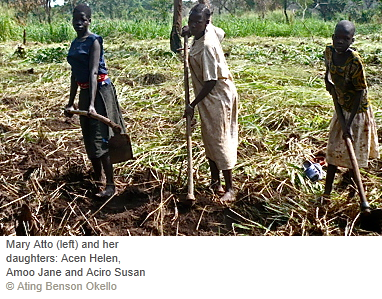 By Ating Benson Okello for Sudanvotes.com
By Ating Benson Okello for Sudanvotes.com
(MAGWI, Eastern Equatoria State) – Gender-based violence and discrimination, widely considered human rights violations, are a setback to nation building. It’s time to heed this truth in South Sudan.
Mary Atto says she has to pull extra weight to support her family because her husband won’t help. Her three daughters, Helen, Jane and Susan would be in school if their father didn’t have other plans for them: early marriage. Fetching a good bride price is his idea of a decent income.

Aol JoyceAol Joyce was married off at 17 to a much older man who, by her account, abuses alcohol, mistreats her and refuses to take responsibility for their children. She would like to be trained as a tailor, but her husband forbids her from any occupation except domestic work.
Christine Atim said her husband’s drinking habits mean she alone has to make sure her children have something to eat.
Their situations are hardly unique.
Studies suggest at least one in every three South Sudanese women has been beaten, coerced into sex, denied her rights or otherwise abused in her lifetime. The perpetrator is often a member of the woman’s own family.
The awareness that women have suffered the brunt of society’s ills is nothing new. It was the leader of South Sudan’s freedom struggle, the late Dr. John Garang, who famously referred to southern Sudanese women as “the marginalised of the marginalised people.”
Christine Atim walks more than 12 kilometres to sell casava at Magwi’s market.As long as traditional perceptions about a woman’s place in society go unquestioned, South Sudan’s newly won freedom will only pertain to the male half of the nation.
Some progress is apparent: South Sudan has welcomed its first female pilot, and a woman was recently elected deputy speaker of the parliament.
But these are exceptions. What prevails is a double standard that praises women as Africa’s most precious and under-appreciated asset, while tacitly accepting a status quo that puts them at a severe disadvantage by denying many of them their basic human rights. This must come to an end.
Challenging Old Attitudes
An informal survey with eight men and women of various backgrounds in Magwi suggested the most common forms of gender-based discrimination or violence in South Sudanese society are forced sex, wife-beating, underpaid work, and sexual harassment in the workplace.
Other practices harmful to women include a widely held belief in taboos that deprive them of protein-rich foods such as eggs, goat meat and poultry. This can lead to a number of adverse health conditions, including infant malnutrition if nursing mothers are denied adequate nourishment.
The list goes on. A society whose women don’t enjoy the same right to literacy, vocational training and general education as men cheats itself out of development in a multitude of ways.
Even women who have gainful employment outside the home carry an extra burden when their partners expect them to perform most of the domestic duties when they return from work.
South Sudan’s interim constitution guarantees equal rights for men and women, girls and boys. It makes no exception for cultural traditions that go against this provision.
Ending discrimination and violence against women requires a long-term commitment from all corners of society. Strategies carried out by communities, health care workers and all levels of governments can contribute to positive change.
Raising public awareness about the adverse effects of physical violence against women should top the priority list. How many abusive men realize that besides the trauma of immediate injury, long-lasting impacts include chronic pain, physical disability, depression and a decline in reproductive health?
According to Becky Aya Obong, Magwi County Commissioner for Gender and Child Welfare, better training of health care providers can help them treat clients who have been subjected to gender-based violence.
Public campaigns that encourage open debate about gender in society can go a long way toward dismantling beliefs and attitudes that lead to—and tolerate–abusive behaviour.
By encouraging gender equality in education and discouraging early marriage, girls have a better chance of living healthier and more fulfilling lives. This does not mean sidelining men; if gender equality is to become a reality across the country, then surely men are needed as vital partners and allies.
State and regional governments should commit to the passage and enforcement of laws that ensure women’s legal rights and punish those guilty of crimes against them.
Only when women gain their rightful place as equal members of society will our nation’s independence have true meaning. When violence against women and other forms of gender-based oppression are no longer considered acceptable, Africa’s newest state can set an extraordinary example of what is possible in the realm of nation-building.
Then the children of women like Aol Joyce, Christine Atim and Mary Atto may have a chance to live out their true potential.
Editor: Alexa Dvorson
Courtesy of Sudanvotes.com